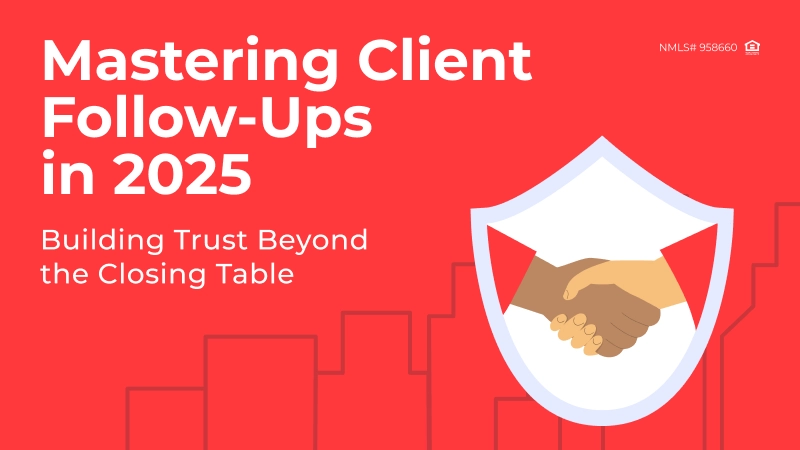2025 is shaping up to be a competitive year for the mortgage industry. With countless options available, it’s easy for homebuyers to get lost in the shuffle. But what truly sets a successful mortgage professional apart isn’t just closing deals; it’s building lasting relationships that extend far beyond the closing table.
In a tough housing market like 2025, client retention will be more important than ever. It’s not just about securing a one-time transaction; it’s about cultivating loyal clients who will return for future needs and refer their friends and family. By focusing on building client trust and providing exceptional service, you can position yourself as a trusted advisor and reap the rewards of long-term business growth.
So, you must be wondering how to accomplish this and set yourself up for a successful year ahead. This article is your answer. We’ll explore the importance of client retention in the coming year and maintaining relationships beyond the closing table; we’ll also look at potential trends in 2025 and suggest effective client retention strategies based on them. Let’s dive in!
The Importance of Client Retention in 2025
While acquiring new clients is essential to any business, the true value lies in retaining the ones you already have. Let’s take a look at some statistics and the current mortgage landscape to understand why client retention will be a top priority in 2025.
The Cost of Acquiring New Clients vs. Retaining Existing Ones
In the competitive mortgage industry of 2025, focusing on retention strategies can significantly improve profitability. Research consistently shows that it “can cost five to seven times more” to acquire a new customer than to retain an existing one. This is particularly true in the mortgage industry. From marketing campaigns to lead generation, the costs can significantly add up very quickly. In fact, according to VenaSolutions, the real estate and financial sectors rank among the top ten industries with the highest customer acquisition costs (CAC), averaging $791 and $784, respectively.
What’s more, retention efforts yield a higher ROI than acquisition. Loyal clients tend to spend more over time and often refer others to your services. Mario DeAlmeida, VP of Marketing at Building Security Services, points out, “In terms of ROI, customer retention often outperforms acquisition. Existing customers are more likely to make repeat purchases and spend more over time.”
Forbes reinforces this point by highlighting, “Your loyal existing customers have a 67% higher average order value than new customers. The chance of converting an existing customer is 60%-70% as opposed to the 5%-20% chance with new customers.” In addition, even a modest improvement in customer retention rates can lead to significant increases in profits. As HubSpot points out, “A 5% increase in customer retention can boost ROI by 25-95%.”
Enhanced Broker Portal
that makes your job easier
- All operations at your fingertips
- Easy-to-use intuitive interface
- Integrated AI technology
Show Me How
Every time you close a deal with a new client, you’re starting from scratch. You have to build client trust, answer questions, and guide them through the complex mortgage process. On the other hand, when you retain an existing client, you already have a relationship. You’ve earned their trust, and they’re more likely to come back to you when they need a mortgage.
Competitive Landscape in the Mortgage Industry
The mortgage market in 2025 is expected to remain highly competitive. According to Business Insider, home prices are projected to rise modestly, and mortgage rates, while high, may slightly ease to around 6%. With more homes on the market due to increased construction and listings, borrowers will have more choices, making it tougher for mortgage professionals to stand out. What’s more, the Mortgage Bankers Association predicts a 30% increase in loan originations, meaning more competition for mortgage professionals.
In this environment, client retention strategies will be crucial. Increased competition means that customer loyalty in the mortgage industry will be harder to earn and maintain. High rates and more options for borrowers could lead to tighter profit margins for mortgage professionals, adding to the challenge.
By focusing on retaining existing clients, you can build stronger relationships and establish trust, ensuring clients return to you for future needs. This not only reduces the cost and effort of acquiring new leads but also helps provide a steady foundation for your business in a crowded market. Loyal clients offer stability and can drive referrals, making them key to thriving in 2025.
Building Trust Beyond the Closing Table
Closing the deal is a great achievement, but for truly sustainable success, you need to build a lasting connection with your clients that extends far beyond the closing table. Below are some ways to cultivate post-closing client engagement and keep them coming back for more.
Personalized Post-Closing Communication
Staying in touch with clients after the closing will show that you genuinely care about their well-being and satisfaction. However, simply sending a generic “congratulations” post-closing email can feel impersonal. Show your clients that they’re more than just another transaction. Expressing your appreciation for their business with handwritten thank-you notes and adding a personal touch can go a long way. You can even personalize them by mentioning something specific you enjoyed about working with them or a detail about their new home they shared. Beyond thank-you notes, consider thoughtful gifts. A small housewarming plant, a personalized cutting board, or a gift certificate to a local restaurant will show that you have thought of them beyond the business transaction.
Don’t forget the power of a simple phone call. Schedule a quick follow-up after a few weeks to see how they’re settling in and answer any questions they may have. This will not only provide valuable support but also reinforce your commitment to their long-term well-being.
Providing Ongoing Value
Consider yourself a trusted advisor, not just a one-time transaction partner. Staying connected by offering ongoing resources will demonstrate your expertise and dedication to your client’s financial future.
Sharing educational content, such as market updates or potential refinancing options, will keep you top of mind and position you as a go-to source for valuable information. A client newsletter filled with relevant and informative articles about mortgages, real estate trends, and financial planning can be a great way to do this.
Leveraging Technology for Relationship Building
Technology plays a vital role in strengthening client relationships. A robust CRM system, such as AD Mortgage’s newly launched LEADer CRM, can help you track client interactions, important dates, and preferences. This allows for more personalized and timely follow-ups, ensuring that no client feels forgotten.
Automation tools can also streamline your client retention strategies. Setting up automated reminders for annual check-ins, updates on refinancing opportunities, or alerts about rate changes keeps your communications timely and relevant. With technology, you can maintain a professional relationship while reducing the effort required for manual client follow-up techniques.
By investing in personalized communications, providing ongoing value, and leveraging technology to stay connected, you’ll build client trust and forge relationships that extend beyond the closing table. Your clients will remember you as the mortgage expert who truly has their back, not just during the initial process, but for years to come.
Effective Client Retention Strategies
In the mortgage industry, strict lending rules make mortgage products nearly identical across companies. As a result, borrowers rarely spend time comparing small differences. Instead, most prioritize price and convenience over loyalty to a specific mortgage lender. To thrive in this competitive landscape, building strong relationships and giving clients compelling reasons to stay with you is essential. In 2025 and beyond, standing out as a mortgage professional will require a focus on client retention strategies.
Implementing Client Appreciation Programs
One effective approach to strengthen client relationships is by implementing client appreciation programs. These programs demonstrate your gratitude and foster loyalty. Consider hosting virtual or in-person events such as webinars, workshops, or social gatherings. These events will offer valuable opportunities to connect with your clients on a personal level, discuss industry trends, and share expert insights. You can also introduce loyalty programs or exclusive benefits, like priority service, discounted fees, or access to exclusive resources. By offering these perks, you incentivize repeat business and reinforce your commitment to providing exceptional service.
Seeking and Utilizing Client Feedback
Another key aspect of retaining clients is actively listening to them through their feedback. Conduct regular surveys or questionnaires to gain valuable insights into your clients’ experiences. By understanding their needs, preferences, and pain points, you can identify areas for improvement and tailor your services accordingly. Once you’ve gathered feedback, take action. Show your clients that their opinions matter by implementing changes based on their suggestions.
For example, if your client frequently complains about long wait times, you can automate processes or hire additional staff to reduce the time it takes to complete tasks. Or, if your client feels overwhelmed by the mortgage process, break it down into smaller, more manageable steps and help them navigate each one. This way, you will demonstrate your responsiveness and commitment to providing a positive client experience.
Encouraging Client Referrals
Another powerful client retention strategy is to encourage referrals, increasing your chances of expanding your reach and attracting new business. You can implement referral incentive programs to motivate your clients to recommend your services. These programs can offer rewards such as cash bonuses, gift cards, or exclusive discounts to clients who refer friends, family, or colleagues. While this may seem encouraging and appealing, the real value is in consistently delivering exceptional service. When clients are delighted with your work, they’re more likely to recommend you to others without any additional incentives.
By implementing these client retention strategies, you can build strong, lasting relationships with your clients, differentiate your business, and drive growth.
Enhancing Communication Channels
Effective communication will be a cornerstone of successful client retention strategies in 2025. As the mortgage industry becomes increasingly competitive and digitized, the way mortgage professionals communicate can make or break relationships. Borrowers will expect more personalized, efficient, transparent, and innovative service. So by embracing digital communication platforms, maintaining regular contact, and adapting to client preferences, you can differentiate yourself, build trust, and foster long-term relationships.
One effective way to ensure strong communication and adapt to the highly demanding environment is to use social media to engage with your clients. These platforms offer a unique opportunity to share industry insights, answer questions, and build brand awareness. By posting relevant content, such as educational articles, market updates, or personal industry-related stories, you can not only stay in touch and actively engage with your current clients but also attract new ones. You can also use social media to respond promptly to comments, messages, and reviews, demonstrating your commitment to excellent customer service.
Another option is to offer online portals or applications that give clients easy access to important information. For example, Floify – a tool that provides a secure communication and document management portal between lenders, borrowers, real estate agents, referral partners, and other loan stakeholders. nCino’s Mortgage Suite – software that automates loan processing and closing, provides modern customer convenience, unlocks data insights, and simplifies incentive compensation management. DocuSign – an electronic signature platform that allows clients to sign documents remotely and securely.
These digital platforms can be used to securely share documents, track the progress of their loan application, and communicate with their loan officer. By providing a centralized hub for all relevant information, you can save time, reduce paperwork, and improve transparency.
Maintaining Regular Contact
Regular communication is just as important as the platforms you use. To maintain strong client relationships, you can establish a regular communication calendar. This calendar should outline key touchpoints throughout the loan process, such as initial contact, pre-approval, application submission, underwriting, closing, and post-closing. By scheduling regular check-ins, you can keep your clients informed, address any concerns, and build rapport.
In addition to scheduled communications, personalized emails and messages can help you stay connected with your clients. These messages can be used to share relevant news, offer helpful tips, or simply check in.
Adapting to Client Preferences
Adapting your communication methods to each client’s preferred method of contact is essential to building trust and improving retention. For instance, millennial borrowers, who make up 38% of today’s housing market (according to NAR’s research), often prefer email or text messaging. Gen Xers, comprising 4% of recent homebuyers, may favor phone calls for their more personal touch. Meanwhile, Gen Z clients, who are increasingly entering the market, may prefer social media channels for updates and engagement. Beyond generational trends, each client may have unique communication preferences. Taking the time to understand these preferences and tailoring your approach will demonstrate respect for their time and needs. By adapting your communication style to their expectations, you will ensure your messages are timely, effective, and well-received, fostering stronger connections and loyalty.
Anticipating 2025 Trends in Client Retention
As we step into 2025, the client retention landscape is poised for transformation. Client retention will become even more critical, and technology, particularly artificial intelligence (AI), will play a pivotal role. Let’s take a look at potential client retention trends in the coming year.
Artificial Intelligence and Personalization
One of the most transformative trends expected to dominate customer engagement in 2025 is the integration of artificial intelligence into client interactions. No longer a futuristic concept, AI has become a practical tool that is reshaping the way mortgage professionals engage with their clients.
Get the ADvantage
with our loyalty program
Earn and redeem points for valuable benefits for you and your clients
Unlock Rewards
AI is becoming increasingly sophisticated, allowing you to offer more personalized experiences. AI can analyze vast amounts of customer data to understand individual preferences, needs, and financial situations. This can enable you to make tailored recommendations, from suggesting suitable loan products to providing timely updates on the application process. By analyzing past behavior and market trends, AI can anticipate future needs, allowing you to proactively offer solutions. AI-driven tools can tailor communication channels and messaging to individual preferences, whether it’s email, text, or phone calls. AI can also provide tailored financial advice based on specific circumstances, helping clients make the right decisions. All of this not only improves efficiency but also creates a more responsive and customer-centric approach that is critical to retention.
Data Security and Privacy
In an era of increasing cyber threats, protecting client data becomes paramount. A data breach can not only damage your reputation but also erode trust. As data security continues to gain importance in 2025, implementing robust measures is not optional – it’s essential.
Beyond regulatory compliance, building trust through transparent data practices will be key. Clients want to know that their information is safe and used responsibly. To foster this trust, consider collecting only the necessary data, implementing strong security protocols, and communicating how client data is collected, stored, and used.
Sustainable and Ethical Business Practices
Sustainability and ethics are increasingly influencing consumer choices in the housing market. Clients are looking for mortgage professionals who align with their values, especially those related to sustainability and corporate social responsibility (CSR). By emphasizing green lending options, such as mortgages for energy-efficient homes, and practicing CSR, you can appeal to the growing segment of eco-conscious clients. This trend is not just beneficial for attracting clients but also for retaining them.
Aligning business practices with these values can create a deeper connection with clients, making them more likely to stay loyal for the long term.
Conclusion
In an era of increasing competition, building trust and fostering long-term relationships with clients is the cornerstone of a successful mortgage business. As we look to 2025, it is more important than ever to prioritize client retention strategies.
By focusing on personalized communications, providing ongoing value, and leveraging technology to streamline processes and enhance the client experience, you can differentiate yourself and drive business growth.
Remember, a happy customer is a loyal customer. By investing in your client relationships, you’re not just securing one-time transactions, you’re building a foundation for future business and referrals.
Looking to enhance your mortgage client retention efforts? Explore AD Mortgage’s resources or consult with our experts. Let’s work together to build stronger relationships and achieve lasting success.



